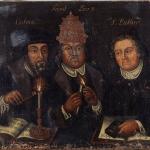
The position of many Protestants (particularly many Calvinists) on this issue is hopelessly contradictory and incoherent, with regard to the soteriology of Arminianism and/or Pelagianism and semi-Pelagianism. The definition of the latter is as follows (from two highly authoritative non-Catholic sources):
[Semi-Pelagianism], while not denying the necessity of Grace for salvation, maintained that the first steps towards the Christian life were ordinarily taken by the human will and that Grace supervened only later. (Oxford Dictionary of the Christian Church, edited by F. L. Cross, Oxford Univ. Press, revised edition, 1983, 1258)
The Encyclopedia Britannica (1985 edition, vol. 10, 625) states:
The result of Semi-Pelagianism, however, was the denial of the necessity of God’s unmerited, supernatural, gracious empowering of man’s will for saving action . . . From [529] . . . Semi-Pelagianism was recognized as a heresy in the Roman Catholic Church.
Indeed, the Catholic Church – despite constant bogus and astonishingly uninformed claims by Calvinists – has vigorously opposed Pelagianism in all forms from the time of St. Augustine. The Second Council of Orange (529 A.D.), accepted as dogma by the Catholic Church, dogmatically taught in its Canon VII:
If anyone asserts that we can, by our natural powers, think as we ought, or choose any good pertaining to the salvation of eternal life . . . without the illumination and inspiration of the Holy Spirit . . . he is misled by a heretical spirit . . . [goes on to cite Jn 15:5, 2 Cor 3:5]
Likewise, the ecumenical Council of Trent (1545-63): Chapter V, Decree on Justification:
. . . Man . . . is not able, by his own free-will, without the grace of God, to move himself unto justice in His sight.
And Canon I on Justification:
If anyone saith that man may be justified before God by his own works, whether done through the teaching of human nature or that of the law, without the grace of God through Jesus Christ; let him be anathema.
Catholic theologian Ludwig Ott describes the Catholic view:
As God’s grace is the presupposition and foundation of supernatural good works, by which man merits eternal life, so salutary works are, at the same time gifts of God and meritorious acts of man. (Fundamentals of Catholic Dogma, Rockford, Illinois: TAN Books, 1974 [orig. 1952], 264)
St. Augustine wrote (and the Catholic Church wholeheartedly concurs):
What merit of man is there before grace by which he can achieve grace, as only grace works every one of our good merits in us, and as God, when He crowns our merits, crowns nothing else but His own gifts? (Ep. 194, 5, 19; in Ott, 265)
The concept of merit and its corollary reward is well-supported in Scripture: Mt 5:12, 19:17,21,29,25:21, 25:34 ff., Lk 6:38, Rom 2:6, 1 Cor 3:8, 9:17, Col 3:24, Heb 6:10, 10:35, 11:6, 2 Tim 4:8, Eph 6:8. Trent must be understood in this light, and nothing in it contradicts 2nd Orange, Scripture, or the doctrine of all grace as originating from God, not man. Thus, neither Trent nor Catholicism is Pelagian or semi-Pelagian.
Arminianism derives, classically, from the Remonstrance of 1610, a codification of the teachings of Jacob Arminius (1559-1609). Here are the 3rd and 4th articles of five:
III. That man has not saving grace of himself, nor of the working of his own free-will, inasmuch as in his state of apostasy and sin he can for himself and by himself think nothing that is good–nothing, that is, truly good, such as saving faith is, above all else. But that it is necessary that by God, in Christ and through his Holy Spirit he be born again and renewed in understanding, affections and will and in all his faculties, that he may be able to understand, think, will, and perform what is truly good, according to the Word of God [John 15:5].
IV. That this grace of God is the beginning, the progress and the end of all good; so that even the regenerate man can neither think, will nor effect any good, nor withstand any temptation to evil, without grace precedent (or prevenient), awakening, following and co-operating. So that all good deeds and all movements towards good that can be conceived in through must be ascribed to the grace of God in Christ. But with respect to the mode of operation, grace is not irresistible; for it is written of many that they resisted the Holy Spirit [Acts 7 and elsewhere passim].
Much more documentation from the many Arminian denominations could easily be produced. But two shall suffice at this point. John Wesley and the Methodists have long been a target of Calvinist suspicion and disdain. Wesley’s Twenty-Five Articles of Religion (1784), considered normative for Methodists, states in its Article VIII (“Of Free Will” – virtually the same as Article X of the Anglican Thirty-Nine Articles); emphasis added:
The condition of man after the fall of Adam is such that he can not turn and prepare himself, by his own natural strength and works, to faith and calling upon God; wherefore we have no power to do good works, pleasant and acceptable to God, without the grace of God by Christ preventing us, that we may have a good will, and working with us, when we have that good will. (in Creeds of the Churches, edited by John H. Leith, Garden City: New York: Doubleday Anchor, 1963, 356)
Likewise, in the Lutheran Formula of Concord (1580), the distinction between Melanchthonian Arminianism and semi-Pelagianism could not have been more clearly stated (emphasis added):
We also reject the error of the Semi-Pelagians who teach that man by virtue of his own powers could make a beginning of his conversion but could not complete it without the grace of the Holy Spirit. (Part I: Epitome, Article II: Free Will, Antitheses: Contrary False Doctrine, section 3; cf. Solid Declaration, Article II: Free Will, error #2: “coarse Pelagians”)
Error #3 presents a critique of a twisted straw man version of Tridentine Catholicism’s soteriology, supposedly semi-Pelagian, which only serves to reinforce the fact that confessional Lutheranism indeed vigorously opposes semi-Pelagian doctrine.
***
Further related thoughts (from 1997):
As a former consciously Arminian evangelical, I (as well as any like-minded friends with whom I discussed this) had no wish whatsoever to “compromise God’s power and sovereignty,” as Calvinists often charge. I (and they) held those truths and the ostensibly self-evident (and biblically evident) reality of human freedom together in paradox, precisely as I do now as a Catholic.
I think the proper analytical dynamic vis-a-vis so-called “Arminian heterodoxy” is to tie it in with liberal Protestant uses of it. In other words, I think theological liberalism (or pentecostal heresy; e.g., Kenneth Copeland et al) is the ultimate culprit where God’s sovereignty is brought into question, not the system of Arminianism as historically and theologically understood (i.e., Jacob Arminius, Remonstrance, etc.).
I vehemently reject the claim that Arminians are Semi-Pelagians (or Pelagians), and I have argued the contrary in debate with Calvinists. As always, the terms must be carefully defined. In my opinion, the Five Points of the Remonstrance of 1610 are virtually identical (prima facie) with Catholic Molinism (of which I am one):
1) Election is conditioned upon man’s response (conditional election)
2) Universal Atonement
3) “Unaided by the Holy Spirit, no person is able to respond to God’s will” (thus eliminating the categorization of either “Pelagian” or “Semi-Pelagian.” The latter holds that the first steps are originated by the human will rather than by the Holy Spirit)
4) Grace is not irresistible
5) Possibility of falling away from grace
There are certainly many “Arminian liberals.” But my point is that we can only go by the “books,” creedal statements, systematic theologies, confessions, catechisms, etc. on both sides, in order to have a constructive and fair discussion. We cannot honestly and fairly compare Arminian practice (thus including liberals who dishonestly deny the Arminian formularies) with sophisticated (orthodox) Catholic Tridentine or Augustinian or Thomist dogma and doctrine.
This is improper and unfair, just as it is unfair for Calvinists to compare their books with Catholic practice (citing the many Pelagian ignoramuses in the pews, Marian devotional excess, dissidents, Ted Kennedy, etc.). Just as I have often argued that “Catholic liberals” are irrelevant with regard to what my Church teaches and believes, likewise we should not lump Protestant liberals in with evangelicals, such as many of us previously were (and I remember full well how I would have felt about such a correlation! :-) This is all the more important, I think, in matters of theological definition, such as “Semi-Pelagian,” “Calvinist,” “Total Depravity,” “Arminian,” etc.
I would say that applying “Arminian” to a belief in Pelagianism or Process Theology is nonsensical, just as much as applying “Calvinism” to an Arminian (in my definition) is. And of course we have all sorts of buffoons calling themselves “Catholic,” so that we are sadly familiar with this dynamic ourselves. Likewise, evangelicals have their wolves in sheep’s clothing as well. J. Gresham Machen (in the 30s) and Francis Schaeffer (in the 70s and 80s) fought for Presbyterian orthodoxy. Norman Geisler has recently been fighting for adherence to the traditions of the Evangelical Free Church, etc.
It is not necessary to have an infallible authority for the mere purpose of distinguishing theologies. The creed that the Arminian can appeal to is the Remonstrance, which is the historical root, and also the Methodist and later Lutheran formularies and creeds. That is something that can be “grabbed onto.” Thus, there is authority at least on a denominational level. Weak? Sure. Non-binding? Yes, usually. Do people use labels falsely? All the time. But I can’t define my terms based on ignorance and abuse. There has to be some objective measure of the defining of terms.This isn’t substantially different from Calvinist appeals to the Institutes or the Westminster Confession, or the Synod of Dort.
If Calvinism can be analyzed from the perspective of TULIP, the Arminianism can be spoken of with reference to the Remonstrance, which – if I am correct – is what actually led to the clarification of TULIP. Why should any conservative Christian operate by liberal definitions? There are historical backgrounds to theological words. If the heterodox (whether in a Catholic or a Protestant context) get us to use terms the way they use them, they are winning half the battle.
***
(originally from 1997 and 12-4-02)
Photo credit: Jacob Arminius: portrait by Hieronymus van der Mij (1687-1761), after Michiel van Miereveldt (1566-1641) [public domain / Wikimedia Commons]
***













